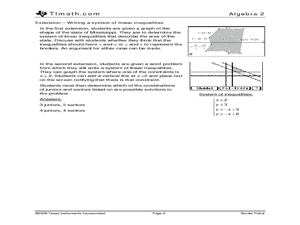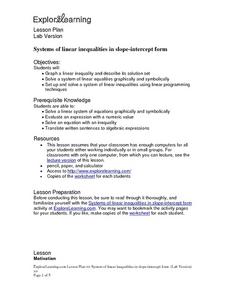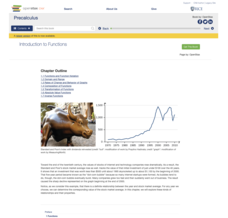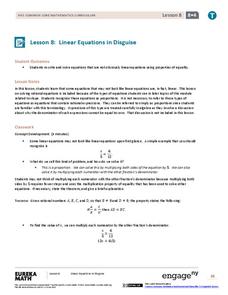Curated OER
Variables and Expressions
In this variables and expressions worksheet, students solve and complete 35 different problems that include translating various expressions. First, they indicate with math symbols the operations being described by each given word. Then,...
Curated OER
Border Patrol
Young scholars investigate systems of linear inequalities as they apply to an area of land. They practice graphing systems and determine if a point lies in the solution.
Curated OER
Reducing Fractions to Lowest Terms
In this Algebra I/Algebra II worksheet, students reduce algebraic fractions to lowest terms. The one page worksheet contains a combination of eleven multiple choice and free response problems. Answers are provided.
Curated OER
Dividing Fractions
In this Algebra I/Algebra II worksheet, students multiply and divide algebraic fractions. The one page worksheet contains four free response questions. Answers are included.
Curated OER
Solve and Graph Compound Inequalities
In this algebra worksheet, students solve inequalities and graph it on a number line. They use correct graphing method when dealing greater than and less than. There are 3 questions with an answer key.
Curated OER
Write the inequalities for each graph
In this algebra activity, students are given graphs of inequalities and asked to write the equation for each graph. There are 5 questions with an answer key.
Curated OER
Solving Multi-Step Inequalities
In this math worksheet, learners solve inequalities. Four problems involve negative values for the variables. Inequalities involve two or more steps to solve. The final two problems are word problems.
Curated OER
Systems of linear inequalities in slope-intercept form
Students graph a linear inequality and describe its solution set. They solve a system of linear equalities graphically and symbolically. Students set up and solve a system of linear inequalities using linear programming techniques. ...
Curated OER
Solving Inequalities
Eighth graders participate in a instructional activity that covers the concept of an algebraic inequality. They practice recognizing the symbols used in an inequality and solving them using the methods that are similar to solving equations.
Curated OER
Linear Inequalities
Ninth graders explore solving linear inequalities. They discuss vocabulary words and symbols associated with linear inequalities. After a demonstration by the teacher, 9th graders solve and graph inequalities. Students complete a...
Curated OER
Quiz: Solving Inequalities by Adding and Subtracting
In this solving inequality worksheet, students solve inequality equations containing one variable, whole numbers and decimal numbers. This one-page worksheet contains ten problems.
Virginia Department of Education
Greetings
Welcome learners to the world of algebra. Use a lesson that poses a situation involving the profit from creating greeting cards to teach about algebra. It requires scholars to use linear functions and inequalities to solve problems.
Inside Mathematics
Two Solutions
Many problems in life have more than one possible solution, and the same is true for advanced mathematics. Scholars solve seven problems that all have at least two solutions. Then three higher-level thinking questions challenge them to...
Willow Tree
Problem Solving
School subjects connect when your young scholars use math to edit English. Math allows you to convert an entire paragraph into a simple equation or inequality. Examples encourage learners to write expressions, equations, and inequalities...
CCSS Math Activities
Smarter Balanced Sample Items: 7th Grade Math – Target D
Put expressions, equations, and inequalities to work! Young scholars solve problems using various strategies. Meant as a snapshot of the Smarter Balanced Assessment, a set of seven questions includes topics from writing expressions to...
EngageNY
Read Expressions in Which Letters Stand for Numbers II
Reading and writing take on a whole different meaning in math class. Young mathematicians learn to read verbal phrases by focusing on operation words. They write equivalent algebraic expressions for both mathematical and contextual...
EngageNY
Read Expressions in Which Letters Stand for Numbers
Pencil in the resource on writing verbal phrases into your lesson plans. The 15th installment of a 36-part module has scholars write verbal phases for algebraic expressions. They complete a set of problems to solidify this skill.
EngageNY
Mid-Module Assessment Task - Algebra 1 (module 2)
A mid-module assessment uses two multi-part questions to measure progress toward mastery on descriptive statistics standards. Each part of a question addresses a single standard to help determine mastery.
EngageNY
Mid-Module Assessment Task - Algebra 2 (Module 1)
Challenge classes to think deeply and apply their understanding of polynomials. The assessment prompts learners to use polynomial functions to model different situations and use them to make predictions and conclusions.
EngageNY
True and False Number Sentences II
Substitution is still the method of choice to verify number sentences. The detailed lesson has young mathematicians determining conditions for when number sentences are true or false through substitution. They learn to express these...
5280 Math
Stories That Formulas Tell
Learn the stories a formula holds. An interesting lesson takes a unique approach to teach how to use formulas. Beginning with a formula, learners predict what the variables stand for and then use the formula to make calculations and tell...
Inside Mathematics
Party
Thirty at the party won't cost any more than twenty-five. The assessment task provides a scenario for the cost of a party where the initial fee covers a given number of guests. The class determines the cost for specific numbers of guests...
Rice University
Precalculus
Take a step beyond Algebra 2. Learners use the eBook to learn concepts from the typical Precalculus course. Content starts off with a short review of functions in general and moves on to the basic functions, finishing up with more...
EngageNY
Linear Equations in Disguise
In the eighth segment of a 33-part unit, learners look at equations that do not appear to be linear at first glance. The equations are proportions where the numerators and denominators may have more than one term. To round out the...

























